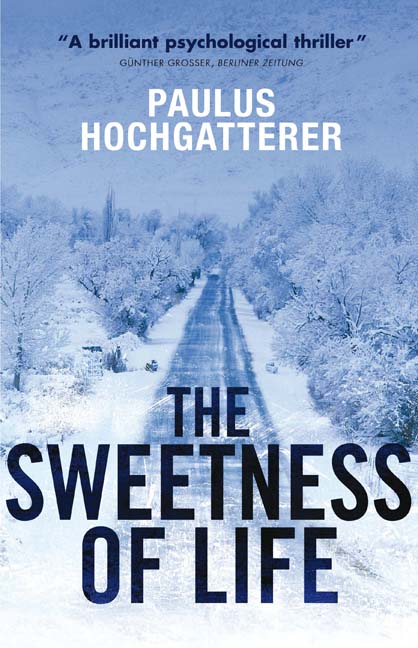
EURO CRIME
Reviews

Hochgatterer, Paulus - 'The Sweetness of Life' (translated by Jamie Bulloch)
Hardback: 256 pages (July 2008) Publisher: Quercus ISBN: 1847243886
Set in an Alpine village in Austria, THE SWEETNESS OF LIFE is more concerned with the lives and thoughts of the inhabitants than with the investigation and impact of the death which occurs at the start of the book. The plus side, for me, is the author's assured, detailed account of life and culture in a small-town environment. However, the slight downside is that the mystery element is not well-developed. The death is that of an elderly grandfather, who is playing ludo with his granddaughter when the doorbell rings. The old man goes out but does not return: the girl goes to look for him and finds him dead in the snow - in circumstances that cannot be natural.
In the next couple of chapters the reader is introduced to two characters, psychiatrist Raffael Horn and the compulsive Joseph Bauer. We then switch to an account of the investigation of the death, run by local police chief Ludwig Kovacs. Events are described from the perspective of a different character in each chapter, so we become quickly aware of Kovacs's mild irritation that his two best detectives are on vacation but his pleasure at the apparent aptitude of one of the substitutes, and experience his perceptions of the dead man's family. After the initial start to the investigation, the book veers off into more descriptions of life in the village as seen through the eyes of various characters - schoolteacher, priest and so on. In some cases this approach works very well, particularly in the chapters featuring Horn and Kovacs, which I enjoyed very much. Through their eyes, one experiences the claustrophobia, racism and petty corruptions of life in an outwardly conventional, old-fashioned and somewhat isolated place, and the author's powers of observation are superb.
Other characters work less well, and as the book swings between various points of view (presumably we are intended to have suspicions of at least some of the subjects), focus is lost. An example is that much of the action takes place at the hospital where Horn works, but because so many of the circumstances of the patients and staff are described, it is hard to keep them all straight, especially as several feature only briefly and then their stories are left hanging. Similarly, Horn's wife, a musician called Irene, is a troubled character with a history, but she, and her uncomfortable relationship with one (possibly both) of their sons, are sketched rather than explored.
Kovacs is, for me, the most interesting character. As the book progresses, one really feels one knows this man and his life: his failed marriage, his affair with Marlene, his relationship with Lefti, the Turkish owner of a beer garden, his detailed knowledge of the hypocrisy and acute observation of his locality, are superbly well conveyed.
Eventually, some of the strands of the story converge when Katharina, the granddaughter of the dead man, is brought by her mother to Horn for treatment because she has not spoken since her grandfather's demise, and is still clutching the ludo pieces she was holding when she discovered the body. As Horn tries to get the girl to speak in some acutely observed psychotherapy sessions, various characters, young and old, continue to behave in suspicious ways, and Kovacs tries to work out whether one of the many kinds of nastiness (sometimes extremely chilling) in the village could be due to the actions of a murderer.
Eventually the case is solved, but the solution, although a tragic story in itself, lacks impact. I think this is partly because the book is not about the bereaved family or, as it turns out, very much about the perpetrators. We learn practically nothing about the effect of the grandfather's death on his family, or about their lives, apart from the sessions Horn has with Katharina and what he can surmise when either parent brings her to the clinic. I don't want to give the impression that this is a weak book, as it isn't. It is extremely well-written and translated, Kovacs and Horn are strongly conveyed characters, and I enjoyed reading it very much. I have a feeling that this author's next book (I hope there is one) is going to be even better.
Read another review of THE SWEETNESS OF LIFE.
Maxine Clarke, England
October 2008
Details of the author's other books with links to reviews can be found on the Books page.
More European crime fiction reviews can be found on the Reviews page.